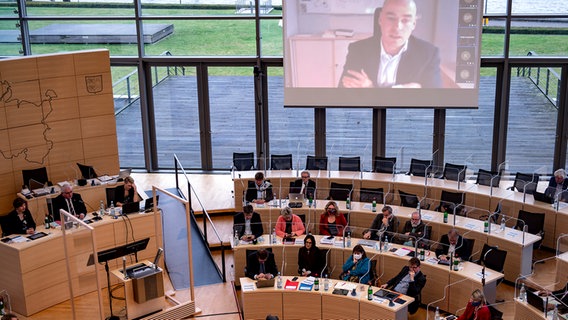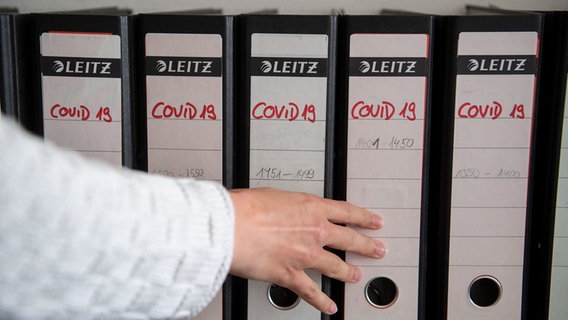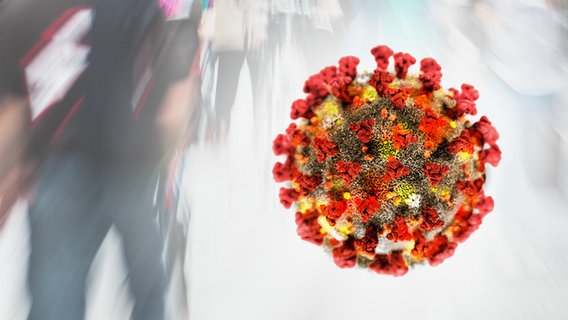Status: 03.03.2021 8:25 a.m.
According to their own statements, most health authorities are currently keeping up with the processing of new corona cases – and would manage even more. That was the result of a query from NDR Schleswig-Holstein.
by Daniel Kummetz
Until the last Prime Minister’s Conference, this value was the red line: If there are more than 50 new corona infections per 100,000 inhabitants in a week, stricter rules would have to be applied there. Until then, the assumption was that from then on it would be difficult for the health authorities to trace contacts and chains of infection. At the last meeting of the committee in February it was decided to only take larger opening steps from an incidence of 35 – also because of the more contagious mutations. But this shift in line has not convinced many – and is up for debate again at today’s meeting. A query at all health authorities in Schleswig-Holstein has now shown that almost all of them are currently keeping up with contact tracking – in lockdown, with a nationwide incidence of around 50 new infections per 100,000 inhabitants per week. 11 of the 15 districts and independent cities stated on request that their health authorities usually processed a new corona case no later than 24 hours after receipt – i.e. above all informed the infected person and their closest contact persons.
Incidence between 35 and 50 not a problem
The four other authorities do not want to commit themselves to such average information, that is too “dependent on the case,” explains the Pinneberg district. The city of Kiel reports that a case can be processed in 15 minutes or only after several days. The city of Flensburg currently most severely affected by the infection writes that it is currently difficult for them – with an incidence of over 150 new cases per week per 100,000 inhabitants. Between an incidence of 35 and 50, it was not a problem to process all cases on a daily basis, said the city spokesman. And the circles, which, according to their own statements, process all reports on the same working day, point to large fluctuations: Cases of newly infected people who have previously been quarantined because they are contact persons of another infected person can be processed very quickly, reports the circle North Frisia. Ultimately, the number of contact persons is also decisive.
Authorities struggle with bad data and a lack of cooperation
The corridors in the district building are empty. There are usually around 100 visitors a day. Now, at most, the employees can meet here.
–
The spokesman for the city of Lübeck reports that sometimes the public order office and police first have to do research to find out the correct addresses and telephone numbers. Missing numbers, poor accessibility and “initially lack of cooperation” of those affected sometimes made it difficult to trace contacts, explains the city of Neumünster, for example. The districts of Rendsburg-Eckernförde, Pinneberg and the Duchy of Lauenburg also report that contacts are withheld from them. It is not just about avoiding fines or quarantine for friends, writes the spokesman for the city of Neumünster. “Family ties, insurance status, residence status, experience with regulatory authorities” also played a role. The problem is often resolved, however: “We have relatively frequent, intensive telephone contact with infected people and contact persons, and in the course of further conversations, trust is placed in us in some cases. It is then possible to expand the investigations as well.” The Pinneberg district also reports that “at the latest in a conversation with the doctors from the health department”, people who have not yet been named are registered.
Finding the place of infection is often difficult
The cities Flensburg and Kiel now provide information about the environment in which people become infected in their cities. But that cannot always be found out: While in Kiel and Flensburg this information is only missing for 10 and 20 percent of the cases, respectively, some circles indicate that this is not clear in up to 50 percent of the cases. In Kiel, however, according to the city spokeswoman, there are only likely sources of infection that were determined in the conversation.
Health authorities: Can handle more cases
Many authorities are quite confident in this area: They are sure that they can also guarantee the follow-up at a seven-day incidence of 35 or 50 or even higher values, some answer. “Since we were able to successfully track contact persons with incidences of over 100, tracking is currently not a problem,” writes the spokeswoman for the city of Kiel. Your colleague from North Friesland reports that the processes have been continuously improved over the last year, so that the authority has not seen any major problems in the last few years, when there have been many cases: “In the past few weeks, however, it has been shown that even with an incidence value close to 100, the occurrence was usually still affordable. “
And the Duchy of Lauenburg also reports that an incidence of 80 was feasible – even if the employees were pushed to the limit as a result. The district of Schleswig-Flensburg points out that this can only be achieved with a great deal of commitment by employees who have to deal with a high workload over long distances. The districts of Plön, Steinburg, Ostholstein and the city of Kiel indicate that they are prepared to further increase the number of contact follow-up teams when the number of infections increases.
Yes, his circle can do more, says Stephan Ott, head of the Corona crisis team in the Rendsburg-Eckernförde district. But because of the large fluctuations in the effort required for a case, he doesn’t think much of basing the efficiency of his office on the number of new infections. If you are lucky enough to have a family case, you only have to make one phone call – but a case in a nursing home requires much more effort from the authorities.
Further information

 –
– –
– –
– –
–

